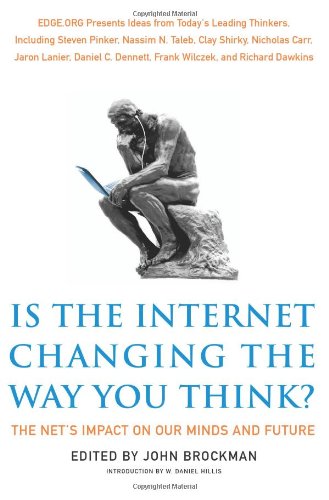Books, Brochures, and Chapters>Book: Kelly, Kevin (January, 2010), An Intermedia with 2 Billion Screens Peering Into It, Edge Foundation, Inc., Retrieved on 2010-10-01Source Material [edge.org]
Folksonomies: culture internet technology society Memes
23 JAN 2011
 Effects of Technology on the Brain
Effects of Technology on the Brain
We already know that our use of technology changes how our brains work. Reading and writing are cognitive tools that, once acquired, change the way in which the brain processes information. When psychologists use neuroimaging technology, like MRI, to compare the brains of literates and illiterates working on a task, they find many differences, and not just when the subjects are reading.
Researcher Alexandre Castro-Caldas discovered that processing between the hemispheres of the brain was diff...Some examples of the technology impacting brain development, including thickening of portions from reading and writing.
23 JAN 2011
 How Technology Makes Us Smarter and More Uncertain
How Technology Makes Us Smarter and More Uncertain
When I do long division or even multiplication I don’t try to remember the intermediate numbers. Long ago I learned to write them down. Because of paper and pencil I am “smarter” in arithmetic. In a similar manner I now no longer to try remember facts, or even where I found the facts. I have learned to summon them on the Internet. Because the Internet is my new pencil and paper, I am “smarter” in factuality.
But my knowledge is now more fragile. For every accepted piece of knowledg...The Internet is a cognitive prosthesis, helping our brains to summon facts, but it also makes us more uncertain about the facts we take for granted, because there are challenges to what we know everywhere online.
23 JAN 2011
 Smaller Fragments of Information Command Attention
Smaller Fragments of Information Command Attention
I do find that smaller and smaller bits of information can command the full attention of my over-educated mind. And not just me; everyone reports succumbing to the lure of fast, tiny, interruptions of information. In response to this incessant barrage of bits, the culture of the Internet has been busy unbundling larger works into minor snippets for sale. Music albums are chopped up and sold as songs; movies become trailers, or even smaller video snips. (I find that many trailers really are be...Kevin Kelly describes how he his attention is grabbed by smaller bits of information and his mind more active as a result.
Parent Reference

Books, Brochures, and Chapters>Book: Brockman, John, ed. (January, 2010), How is the Internet Changing the Way You Think?, Edge Foundation, Inc., Retrieved on 2010-10-01Source Material [edge.org]
Folksonomies: new media 



